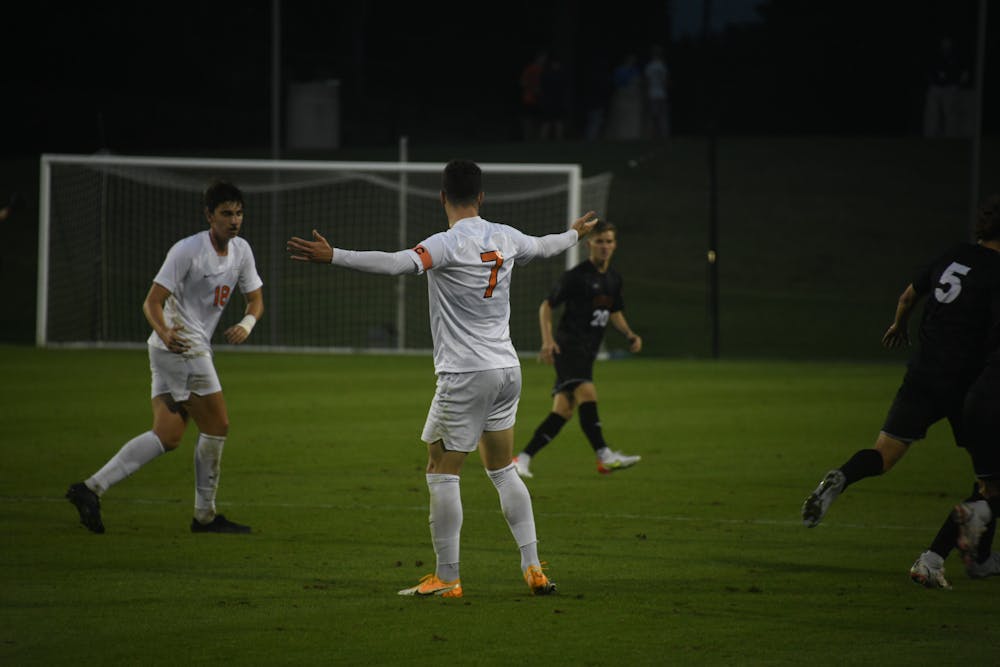In the aftermath of Virginia men’s soccer’s overachieving 2022 season — evidenced by its surge from unranked in the preseason to as high as No. 11 in the country by November — Coach George Gelnovatch and the Cavaliers look primed to reach even bigger heights in 2023.
Virginia enters this campaign off the back of its first winning season and NCAA Tournament berth since 2019. While Gelnovatch’s team should view 2022 as a step in the right direction, their path to another “successful” season will look a little different this time around as projections for the squad are much higher than they were just a year prior.
The Cavaliers — ranked No. 15 in the United Soccer Coaches Preseason Poll — will have to readjust to meet the lofty expectations the program was synonymous with for decades. For many players on Virginia’s roster, and certainly its nine freshmen and 10 sophomores, playing under the weight of a championship forecast will be uncharted territory.
Luckily for the Cavaliers, their 2023 schedule does not pose as much of a challenge on paper as the previous one. This time last year, Virginia was preparing for a season in which eight of its 16 games would be played against opponents who were ranked in the preseason poll. For the 2023 Cavalier squad, only three of 16 opponents are inside the top-25.
Virginia kicks off the season with four consecutive non-conference games, all of which will be played at Klöckner Stadium in Charlottesville. The Cavaliers will open against Iona Aug. 24 before hosting Loyola Marymount and George Mason to finish out their August fixtures. Each contest in the trio will pose its own challenges, but Virginia is expected to charge into a Sep. 4 date with No. 14 Maryland relatively unscathed.
When the Terrapins roll into town that Monday night, Virginia fans can expect their team to be ready for battle. None of Virginia’s returning players will forget the 6-1 thrashing Maryland put on them just less than a year ago. With the added motivation of playing in front of their home support this time around, Gelnovatch and company will have much more in the tank to try and stop their DMV counterparts.
No matter what happens in that fixture, the Cavaliers will need to put it in their rearview mirror almost immediately. Conference play begins just four days later, and Virginia’s Atlantic Coastal Conference opener — a trip to Durham, N.C. for a matchup with No. 4 Duke — may be their toughest test of the campaign.
The Blue Devils and the Cavaliers were separated by just one point in the ACC last season, finishing first and second, respectively. Duke’s slim margin to claim the conference came by way of Virginia losing one more game and tying one less than the Blue Devils. Having played to a 0-0 draw with its divisional foe in 2022 — a game that could’ve placed Virginia at the top of the conference had they won — the Cavaliers know how important all three points are when they step inside Koskinen Stadium on Sep. 8.
The remainder of Virginia’s ACC sledding is smooth, at least in comparison to their opener. Of the Cavaliers’ final seven conference opponents, just one enters the season ranked in the top 25. That team is No. 5 Pittsburgh, who Virginia will host in Charlottesville on Oct. 13. The Cavaliers upset the top-10 Panthers 3-1 on the road last season, setting up a juicy rematch that will bring Pittsburgh into Klöckner looking to enact revenge.
Elsewhere in the ACC, Virginia must also prepare for a trip to Blacksburg, Va. to take on Virginia Tech. The Cavaliers handled the Hokies 4-2 at home last season, but a change of scenery can make all the difference in the Commonwealth Clash. When Virginia steps onto the pitch on Oct. 20, it will be looking to earn its first victory in Blacksburg since 2019.
The Cavaliers have three other road trips to look forward to in the coming months, including conference visits to Notre Dame and Boston College as well as a non-conference affair with James Madison. Virginia lost in the final seconds of its match against the Fighting Irish in 2022, so they won’t be shy about trying to hold off Notre Dame when Sep. 22 rolls around.
Although the Cavaliers will have traveled far and wide by the time their 2023 campaign is closed, 11 of their 16 fixtures are scheduled to be played at home. In addition to its four-game homestand to begin the season, Virginia is set to host seven of their final 10 matches to conclude the regular season.
Those games include battles with Louisville and NC State in September, as well as a season-finale against North Carolina on Oct. 27. In between those ties, the Cavaliers will welcome both Hofstra and High Point to town for a pair of non-conference matchups in October.
All in all, the load is noticeably lighter for Virginia than it was last season. The Cavaliers won’t be seeing any of the top three teams in the Atlantic Division — Clemson, Syracuse and Wake Forest — and are competing in an ACC that has dropped off in quality since last year.
Those elements combine to provide plenty of hope that Gelnovatch’s team will deliver a season to remember, even if the pressure of conference and national titles surrounds them. From Iona in August to the Tar Heels in October, expect fireworks inside Klöckner Stadium.







